Leaves of Grass
 OK, “Song of Myself” drove me crazy. I guess the title should have been warning enough. First, and obviously, it was self obsession squared. Beyond that, I didn't find that much poetry in it. I checked my English and American anthologies and didn't find anyone else doing free verse anywhere near that time, so I guess Whitman invented it? (Wikipedia confirms this.) Whether or not I like him, I guess Whitman deserves much credit for revolutionizing poetry, and maybe literature in general.
OK, “Song of Myself” drove me crazy. I guess the title should have been warning enough. First, and obviously, it was self obsession squared. Beyond that, I didn't find that much poetry in it. I checked my English and American anthologies and didn't find anyone else doing free verse anywhere near that time, so I guess Whitman invented it? (Wikipedia confirms this.) Whether or not I like him, I guess Whitman deserves much credit for revolutionizing poetry, and maybe literature in general.I'll grant him some alliteration. But where is the imagery? Personification? Symbolism or metaphor? Poetry has become a pretty open-ended affair since Whitman, and much of my favorite poetry is free verse, but, in more ways than using lines and stanzas instead of sentences and paragraphs, poetry ought somehow to be distinct from prose.
In later versions, Whitman did eliminate most of the distracting ellipses and exclamation marks from “Song of Myself,” but other than that it remains virtually unchanged. It's consistent with his own declared worldview that he wouldn't see any changes needed in the “barbaric yawp” he first belted out. Indeed, he is proudly “less the reminder of property or qualities, and more the reminder of life.” “What blurt is it about virtue and about vice?” “I exist as I am, that is enough.”
D.H. Lawrence . . . characterized Whitman’s poetry as “long sums in addition and multiplication, of which the answer is invariably MYSELF. He reaches the state of ALLNESS. And what then? It’s all empty. Just an empty Allness” (Eugene England Beyond Romanticism, 210).With Whitman, it's all ecstatically wonderful, and it's all contained within himself. He is the prostitute, the loving mother, the suicide victim bloody on the floor. He is the flatboatman, the seamstress, the president. He even wants to be me, or at least have a relationship with me. I can't remember which poem it was, I just remember the intense repulsion that he could presume to know me, in any sense of the word.
The exaltation of all things to a single level of pantheistic ALLNESS paradoxically reduces their worth. ...Whitman’s exaltation tends to reduce the writings of poetry to an endless cataloguing of indistinguishable and undistinguished particulars, with even their particularity slighted, because the discriminating power inherent in the nature of language is not respected (England, 211).
Of every kind of suffering and experience, he says “All this I swallow and it tastes good, I like it well, and it becomes mine,/ I am the man, I suffered, I was there.” And yet he merely catalogs these theoretical individuals in the loosest, most stereotypical and impersonal way. He doesn't see them clearly enough to give me any unique vision. Here is one the most descriptive passages in “Song of Myself”:
The hounded slave that flags in the race, leans by
the fence, blowing, cover’d with sweat,
The twinges that sting like needles his legs and neck,
the murderous buckshot and the bullets,
All these I feel or am.
I am the hounded slave, I wince at the bite of the dogs.
. . . . . . . . . . . . . . . . . . . . . . . . . . . . . . . . . . . . . . . . . .
I do not ask the wounded person how he feels, I myself
become the wounded person.
Yes, there's some almost-shocking description, but is there any individuality, or does even this relatively detailed (by this poem's standards) description really just represent all slaves who ever tried to escape? I got the feeling from this poem that Whitman really is just about Whitman. He wants to be bigger, to encompass man and nature, but he never steps outside himself long enough to really see anyone or anything else.
But I did like a few of his other poems, mostly “A Noiseless, Patient Spider”—now there's sound and imagery, metaphor and symbolism—and “When Lilacs Last in the Dooryard Bloom'd,” a genuine tribute to someone else, with effective images and symbols like the lilacs and the songbird carefully woven through a coherent whole. Even the title has sound and rhythm.
Unlike “Song of Myself,” everything about “A Noiseless, Patient Spider” resonates well with me, especially the sounds. I want to hear it aloud every time I read it, just enough repetition to tickle my tongue and my ear, but changing too, keeping my attention. And all the sounds so perfect for a web, and a soul's longing—v, f, l, s, p—they whisper, vibrating like a gently plucked string. I suppose it's not entirely unlike “Song of Myself,” (it is still Whitman!) but with quieter longing and with real appreciation for the spider and a sense that maybe there is a particular anchorplace for the soul.






